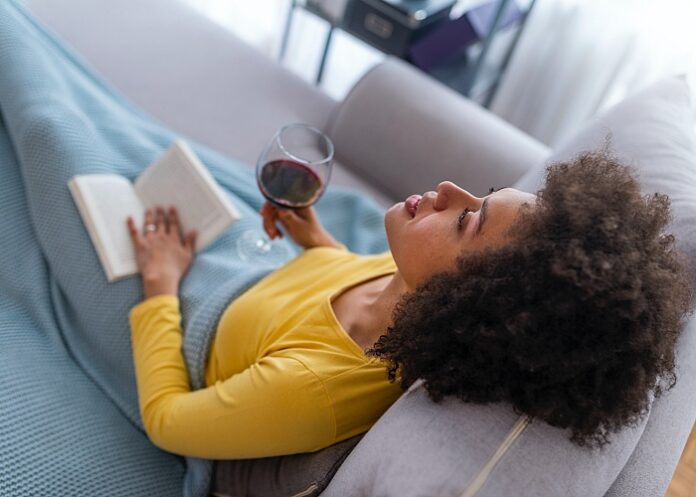Research has found that heavy episodic drinkers in South Africa consumed more alcohol than usual during both increased and decreased COVID-19 lockdown restrictions – and reported drinking more alcohol because they felt stressed, felt a need to relax, and felt bored – writes Ridovhona Mbulaheni for the University of Cape Town.
The researchers from UCT, the University of the Western Cape, Stellenbosch University and the South African Medical Research Council (SAMRC) conducted a survey on Facebook from July to November 2020.
A total of 798 participants took part in the survey, 68.4% of them female, according to the UCT News story published on 9 March 2022.
Published last month in the International Journal of Environmental Research and Public Health, the research found that fewer people categorised as heavy episodic drinkers thought that the alcohol restrictions were a good incentive to reduce their alcohol intake. The majority reported buying alcohol illegally during bans on alcohol sales.
The research found the odds of being classified as a heavy episodic drinker increased for people younger than 65, males, people who drink more frequently than monthly, people who bought alcohol illegally during the alcohol sales restrictions, and those who reported that reducing drinking was more difficult during the restrictions.
“We found that heavy episodic drinkers were prone to consuming more alcohol during restrictions, while moderate drinkers drank the same as usual or less,” said Associate Professor Nadine Harker of the School of Public Health and Family Medicine at UCT and specialist scientist in the Alcohol, Tobacco and other Drug Research Unit at the SAMRC.
“Nearly half of the 798 participants who completed the Facebook survey were classified as heavy episodic drinkers (HED), with more than 60% of males and 43% of females falling in the HED category.”
Increased stress and anxiety
Harker noted that increased lockdown restrictions were especially relevant to increased stress and anxiety compared with decreased lockdown restrictions, when wanting to relax was mentioned before stress.
“During decreased restrictions, the reasons heavy episodic drinkers gave for drinking more alcohol – that were significantly more frequent than for moderate drinkers – were ‘wanting to relax/switch off’, ‘feeling stressed out’ and ‘celebrating when COVID-19 restrictions were lifted/relaxed’.
“Interestingly, we see that ‘being bored’ moved from third to fifth most frequently mentioned,” she said. “‘Money or cost’ reasons, the third most frequent, did not differ significantly between HED and moderate drinkers.”
Reasons given for drinking less alcohol were similar during increased and decreased lockdown restrictions, said Harker.
Dr Petal Petersen-Williams of the Department of Psychiatry and Mental Health at UCT and specialist scientist in the Alcohol, Tobacco and other Drug Research Unit at the SAMRC, said more moderate drinkers stated that they drank less alcohol because ‘it is more difficult to get alcohol with restrictions on going out and shops being closed’ and ‘I haven’t been able to socialise or go out to the pub’.
“Importantly, ‘money or cost’ reasons, the third most frequent, did not differ significantly between HED and moderate drinkers,” she said.
Restrictions not effective
According to Dr Petersen-Williams, moderate drinkers stated that the ‘restrictions were a good time to reduce alcohol intake’, significantly more frequently than the HED group during increased restrictions; it was the fourth most frequent reason given for drinking less.
This research, said Petersen-Williams, shows that limiting alcohol sales or imposing alcohol sales restrictions are not proven to be effective in reducing alcohol intake in people who are classified as heavy episodic drinkers.
“Moderate alcohol consumers may benefit from these restrictions by using them as incentive to reduce their alcohol intake,” she said.
She added that policies intended to increase the pricing of alcohol, such as the World Health Organisation strategy of increasing excise taxes and minimum unit pricing, may have the potential to reduce alcohol intake in a time of crisis.
Study details
Did COVID-19-Related Alcohol Sales Restrictions Reduce Alcohol Consumption? Findings from a National Online Survey in South Africa
Marieke Theron, Rina Swart, Mukhethwa Londani, Charles Parry, Petal Petersen-Williams and Nadine Harker.
Author affiliations: University of the Western Cape, South African Medical Research Council, Stellenbosch University, University of Cape Town.
First published online in the International Journal of Environmental Research and Public Health on 19 February 2022.
Abstract
South Africa has a high prevalence of heavy episodic drinking (HED). Due to the high levels of alcohol misuse and violence, public hospital intensive care units were often overrun during the COVID-19 pandemic. This research investigated alcohol intake behaviour change during differing levels of lockdown restrictions, which included bans on alcohol sales.
Methods
A self-reported Facebook survey ran from July to November 2020. The questions included socio-demographics, income, alcohol intake, purchasing behaviour, and reasoning.
Chi-square tests/Fisher’s exact test for categorical data, Student’s t-test for normal continuous data, and the Mann–Whitney U test for non-normal data were applied. Multiple logistic regression was run for HED versus moderate drinkers.
Results
A total of 798 participants took part in the survey, of whom 68.4% were female. Nearly 50% of participants fell into the HED category and the majority bought alcohol illegally during restrictions. HED respondents who drank more alcohol than usual during restrictions reported that they felt stressed, needed to relax, and were bored.
Conclusions
Policies intended to increase the pricing of alcohol may have the potential to reduce alcohol intake. Reducing stress and anxiety may be key to curtailing HED during emergency situations.
See also from the MedicalBrief archives
Minimum price for alcohol could save thousands of SA lives – Research
Unnatural deaths, alcohol bans and curfews during COVID-19 – SA study
Ramaphosa seeks tougher alcohol abuse laws
Lockdown in UK increased boozing in people with alcohol use disorders

